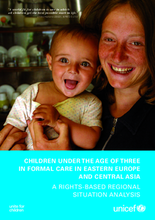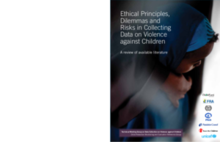Displaying 371 - 380 of 565
In this TED video, Georgette Mulheir, CEO of Lumos, an NGO dedicated to ending worldwide systematic institutionalization, describes how orphanages can cause irreparable damage to children both mentally and physically and urges to end reliance on them by finding alternate ways of supporting children in need.
This paper provides insight into child protection in the context of coordinated action, the architecture of U.S. government assistance, the state of evidence-base, development of appropriate research framework, practice and policy, ethical considerations, and capacity development and knowledge transfer for those advocating for children outside of family care. Recommendations are made to consider how current operational contexts, collaborative relationships and learning-knowledge can be united to focus on the various categories of children outside of family care.
This article reviews the available evidence regarding the efficacy, effectiveness, ethics, and sustainability of approaches to strengthen systems to care for and protect children living outside of family care in low- and middle-income countries.
This article reviews the U.S. Government Evidence Summit on Protecting Children Outside of Family Care held in December 2011 in Washington D.C. The Summit brought together more than 150 of the world’s leading advocates for children to examine the strength of the research evidence on existing programs and interventions, and most importantly to identify critical knowledge gaps and areas where more research is needed so that systems and programs designed to improve the overall health and well-being of these vulnerable children may be strengthened.
The purpose of this review was to identify evidence-based early response strategies and interventions for improving the outcomes of children outside of family care, including children of and on the street, institutionalized children, trafficked children, and children affected by conflict and disaster, and who are exploited for their labor. A conclusion was drawn that there is a strong need for strengthening the evidence base regarding the effectiveness or early assessments and responses to children living outside family care and for using evidence to guide operational policy and practice.
This paper reviews the various methodologies applied to identify and enumerate these often hidden and/or mobile populations. Methodologies that identify and enumerate children outside of family strive to meet two objectives: (1) to estimate the number and characteristics of a specific vulnerability category and (2) to determine eligibility to receive services. Conclusions from these reviews advocate for tailoring a methodology to the specific circumstances under which it is meant to identify or enumerate children outside of family care.
The objective of this review was to strengthen the evidence-base for policy and practice for support of children outside of family care through effective, efficient and sustainable mechanisms for monitoring and evaluation. Findings show that fostering a stronger evidence-base to improve protection for vulnerable children requires evaluations that are integrated into program development, use context-appropriate methodologies able to assess intervention scalability and employ more longitudinal designs to explore children’s trajectories.
Recognizing the need for evidence to inform policies, strategies, and programs to care for vulnerable children, the U.S. Government convened an Evidence Summit on Protecting Children Outside of Family Care on December 12–13, 2011, in Washington, D.C., USA. This paper summarizes the background and methods for the acquisition and evaluation of the evidence used to achieve the goals of the Summit.
Through a comprehensive statistical analysis and literature review, this UNICEF report provides a child rights-based up-to-date review of the situation of children under the age of three in formal care in the countries of Central and Eastern Europe and the Commonwealth of Independent States (CEECIS).
The literature review, “Ethical Principles, Dilemmas and Risks in Collecting Data on Violence against Children” aims to capture current thinking around ethical issues and provide empirical support to guide recommendations for ethical research practice and decision-making in collecting data on violence against children (VAC). The review examines documentation that is of specific relevance to research ethics in collecting data on VAC and includes ethics guidelines, codes, protocols and practice related documentation, as well as research-based publications.


